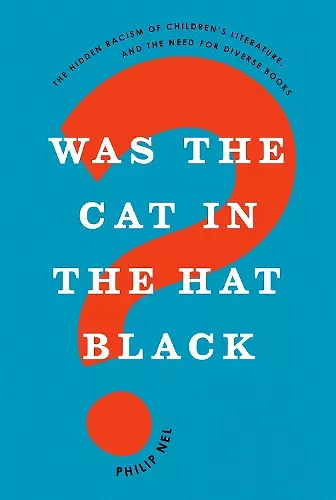Was the Cat in the Hat Black?
The Hidden Racism of Children's Literature, and the Need for Diverse Books
Format:Paperback
Publisher:Oxford University Press Inc
Published:30th May '19
Should be back in stock very soon

Racism is resilient, duplicitous, and endlessly adaptable, so it is no surprise that America is again in a period of civil rights activism. A significant reason racism endures is because it is structural: it's embedded in culture and in institutions. One of the places that racism hides-and thus perhaps the best place to oppose it-is books for young people. Was the Cat in the Hat Black? presents five serious critiques of the history and current state of children's literature tempestuous relationship with both implicit and explicit forms of racism. The book fearlessly examines topics both vivid-such as The Cat in the Hat's roots in blackface minstrelsy-and more opaque, like how the children's book industry can perpetuate structural racism via whitewashed covers even while making efforts to increase diversity. Rooted in research yet written with a lively, crackling touch, Nel delves into years of literary criticism and recent sociological data in order to show a better way forward. Though much of what is proposed here could be endlessly argued, the knowledge that what we learn in childhood imparts both subtle and explicit lessons about whose lives matter is not debatable. The text concludes with a short and stark proposal of actions everyone-reader, author, publisher, scholar, citizen- can take to fight the biases and prejudices that infect children's literature. While Was the Cat in the Hat Black? does not assume it has all the answers to such a deeply systemic problem, its audacity should stimulate discussion and activism.
CHOICE Outstanding Academic Title (2018)
The strength of Nel's book is accessibility. Nel's analysis is thought provoking and deep, and his tone and style open the discussion to a wide audience. Nel concludes with a "manifesto" that lists actions all readers can easily accomplish, and this call to action adds to the book's impact. Though the need for diversity in children's books has been the subject of numerous articles and blogs, Nel's book is the first detailed scholarly examination of this subject. Joining Suriyan Panlay's Racism in Contemporary African American Children's and Young Adult Literature (2016), which examines internalized racism in fiction by African American authors, Nel's book is required reading. ... Summing Up: Essential. Lower division undergraduates through faculty and professionals; general readers. * P.J. Kurtz, CHOICE *
Like a detective working a literary crime scene, Nel patiently builds his case by piecing together clues and evidence in well-known stories from Dr. Seuss, and in the current young adult fiction renaissance. Nel uses such terms as invisible, covert, hidden, absence and erasure more than 70 times, by my count, to describe systemic racism's clandestine modus operandi. * John Murawski, News and Observer *
In this powerful, deeply-researched, accessible study, Nel exposes the racial power of children's literature. A rousing call to consciousness and action, Was the Cat in the Hat Black? shows how children's literature [can] help build an anti-racist future. This book should be required reading for everyone-scholars, librarians, teachers, authors, readers, and more-who cares about children's literature. * Robin Bernstein, Harvard University *
Philip Nel's provocative book investigates the role of whiteness in creating conventions of children's literature and speaks directly to the field's profound omissions, defamations, and erasures. Not only does Nel excavate the hidden lineages and vexed investments of major authors like Theodor Geisel, but his argument demonstrates why this kind of interrogative work is fundamentally ethical and necessary to the field. A thoughtful, courageous book, Was the Cat in the Hat Black? links scholarship to activism, inspiring us to engage more fully race theory in our pedagogy, writing, and social practice. * Katharine Capshaw, University of Connecticut *
A state-of-the-art study of race and racism in U.S. children's literature and an impassioned plea to debate its complexity, Was the Cat in the Hat Black? compellingly discerns the racial figurations hiding in plain sight. With theoretical acuity and prodigious learning, Nel shows that the answer to his title demands the cunning and high spirits of the children's books themselves. Thing One and Thing Two, take note. * Eric Lott, Graduate Center, City University of New York *
In this carefully constructed analysis, Nel brilliantly strips away the mask of innocence from Seuss's Cat in the Hat, layer by layer, to reveal the Cat's complex and sordid racial history. Placing this famous feline alongside other time-honored classic characters from American children's literature, Nel removes 'Whiteness's invisibility cloak.' He explodes the excuses that well-meaning scholars have made for these texts for decades, then makes a convincing argument for why young readers need to be exposed to unbowdlerized racist texts from historical and contemporary American literature. A straight, White male scholar, Nel advises: 'Don't just be an ally. Be an accomplice.' As an African American female scholar, I am glad to have Nel alongside us on these front lines. * Michelle Martin, University of Washington *
In each chapter, the author demonstrates why he is considered a master in his field, as he faultlessly blends history and anecdote with insightful criticism. The second chapter, which discusses attempts to sanitize books such as Huckleberry Finn, is particularly enlightening. Directly addressing Alan Gribben's edition of the book, which removes the "N-Word," Nel adeptly points out that removing it not only misses the point of Twain's work, but also makes the book's racism more covert and therefore more insidious...A fascinating and necessary critical work. * Kirkus Reviews *
- Winner of Recipient of the Children's Literature Association's Honor Book Award PROSE Honorable Mention for Literature, the Professional and Scholarly Publishing Division of the Association of American Publishers (AAP).
ISBN: 9780190932879
Dimensions: 137mm x 208mm x 20mm
Weight: 340g
304 pages